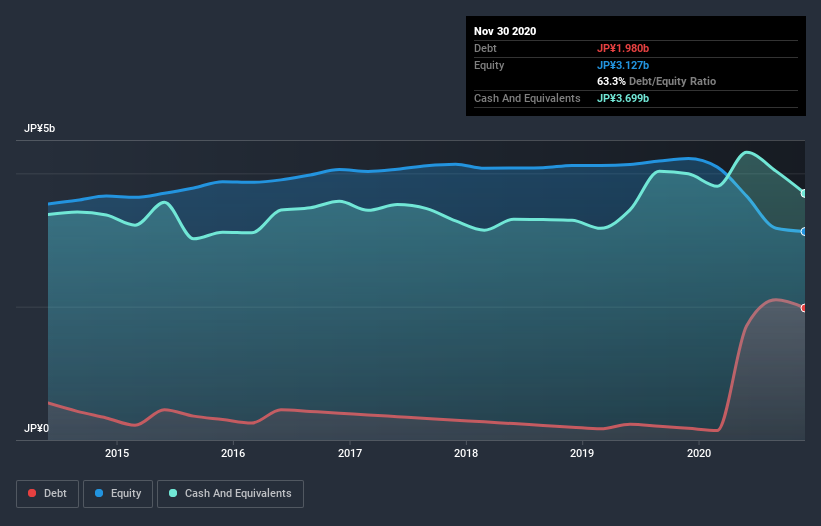
Warren Buffett famously said, 'Volatility is far from synonymous with risk.' When we think about how risky a company is, we always like to look at its use of debt, since debt overload can lead to ruin. We can see that Life Foods Co., Ltd. (TYO:3065) does use debt in its business. But the real question is whether this debt is making the company risky.
Why Does Debt Bring Risk?
Generally speaking, debt only becomes a real problem when a company can't easily pay it off, either by raising capital or with its own cash flow. Ultimately, if the company can't fulfill its legal obligations to repay debt, shareholders could walk away with nothing. However, a more frequent (but still costly) occurrence is where a company must issue shares at bargain-basement prices, permanently diluting shareholders, just to shore up its balance sheet. Of course, debt can be an important tool in businesses, particularly capital heavy businesses. The first thing to do when considering how much debt a business uses is to look at its cash and debt together.
See our latest analysis for Life Foods
How Much Debt Does Life Foods Carry?
As you can see below, at the end of November 2020, Life Foods had JP¥1.98b of debt, up from JP¥175.0m a year ago. Click the image for more detail. However, it does have JP¥3.70b in cash offsetting this, leading to net cash of JP¥1.72b.

How Strong Is Life Foods' Balance Sheet?
According to the last reported balance sheet, Life Foods had liabilities of JP¥1.46b due within 12 months, and liabilities of JP¥2.32b due beyond 12 months. Offsetting this, it had JP¥3.70b in cash and JP¥47.0m in receivables that were due within 12 months. So these liquid assets roughly match the total liabilities.
Having regard to Life Foods' size, it seems that its liquid assets are well balanced with its total liabilities. So while it's hard to imagine that the JP¥5.95b company is struggling for cash, we still think it's worth monitoring its balance sheet. Despite its noteworthy liabilities, Life Foods boasts net cash, so it's fair to say it does not have a heavy debt load! When analysing debt levels, the balance sheet is the obvious place to start. But it is Life Foods's earnings that will influence how the balance sheet holds up in the future. So if you're keen to discover more about its earnings, it might be worth checking out this graph of its long term earnings trend.
In the last year Life Foods had a loss before interest and tax, and actually shrunk its revenue by 24%, to JP¥10b. To be frank that doesn't bode well.
So How Risky Is Life Foods?
Statistically speaking companies that lose money are riskier than those that make money. And we do note that Life Foods had an earnings before interest and tax (EBIT) loss, over the last year. Indeed, in that time it burnt through JP¥1.8b of cash and made a loss of JP¥1.1b. Given it only has net cash of JP¥1.72b, the company may need to raise more capital if it doesn't reach break-even soon. Overall, we'd say the stock is a bit risky, and we're usually very cautious until we see positive free cash flow. The balance sheet is clearly the area to focus on when you are analysing debt. However, not all investment risk resides within the balance sheet - far from it. Be aware that Life Foods is showing 3 warning signs in our investment analysis , and 2 of those are a bit concerning...
When all is said and done, sometimes its easier to focus on companies that don't even need debt. Readers can access a list of growth stocks with zero net debt 100% free, right now.
If you decide to trade Life Foods, use the lowest-cost* platform that is rated #1 Overall by Barron’s, Interactive Brokers. Trade stocks, options, futures, forex, bonds and funds on 135 markets, all from a single integrated account. Promoted
If you're looking to trade Life Foods, open an account with the lowest-cost platform trusted by professionals, Interactive Brokers.
With clients in over 200 countries and territories, and access to 160 markets, IBKR lets you trade stocks, options, futures, forex, bonds and funds from a single integrated account.
Enjoy no hidden fees, no account minimums, and FX conversion rates as low as 0.03%, far better than what most brokers offer.
Sponsored ContentNew: AI Stock Screener & Alerts
Our new AI Stock Screener scans the market every day to uncover opportunities.
• Dividend Powerhouses (3%+ Yield)
• Undervalued Small Caps with Insider Buying
• High growth Tech and AI Companies
Or build your own from over 50 metrics.
This article by Simply Wall St is general in nature. It does not constitute a recommendation to buy or sell any stock, and does not take account of your objectives, or your financial situation. We aim to bring you long-term focused analysis driven by fundamental data. Note that our analysis may not factor in the latest price-sensitive company announcements or qualitative material. Simply Wall St has no position in any stocks mentioned.
*Interactive Brokers Rated Lowest Cost Broker by StockBrokers.com Annual Online Review 2020
Have feedback on this article? Concerned about the content? Get in touch with us directly. Alternatively, email editorial-team (at) simplywallst.com.
About TSE:3065
Excellent balance sheet and good value.
Market Insights
Community Narratives



